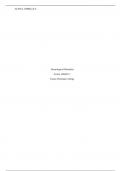Exam (elaborations)
RNSG 1443 Neurological and Neurosensory Disorders practice Study Guide
- Course
- Neurological Disorders
- Institution
- Boston University School Of Medicine
DEMENTIA 1. Symptoms Characterized by multiple cognitive deficits that include memory impairment and at least one of the following cognitive disturbances: o Aphasia o Apraxia o Agnosia o Disturbances in executive thinking The deficits must be severe enough to cause impairment in occ...
[Show more]



